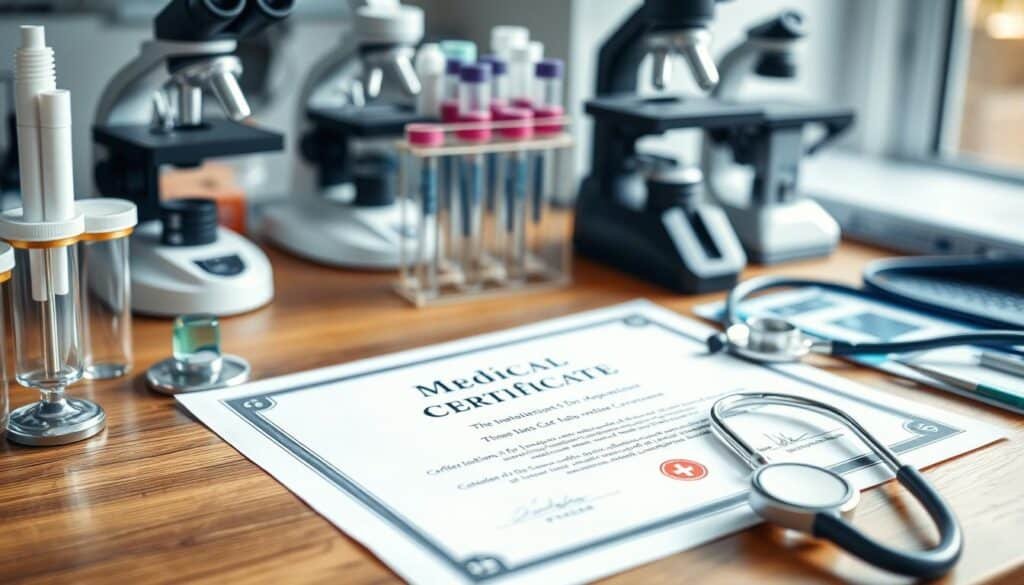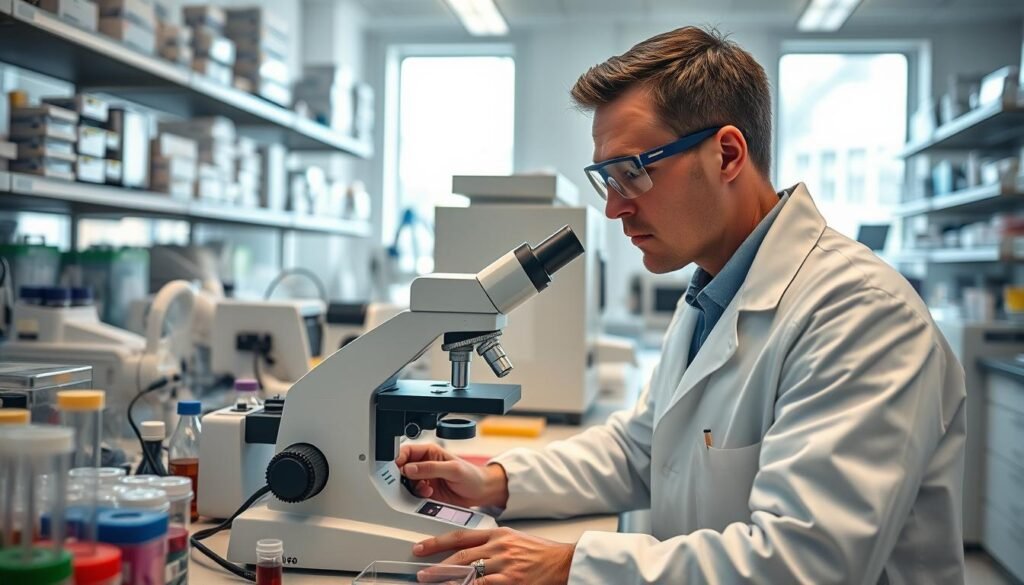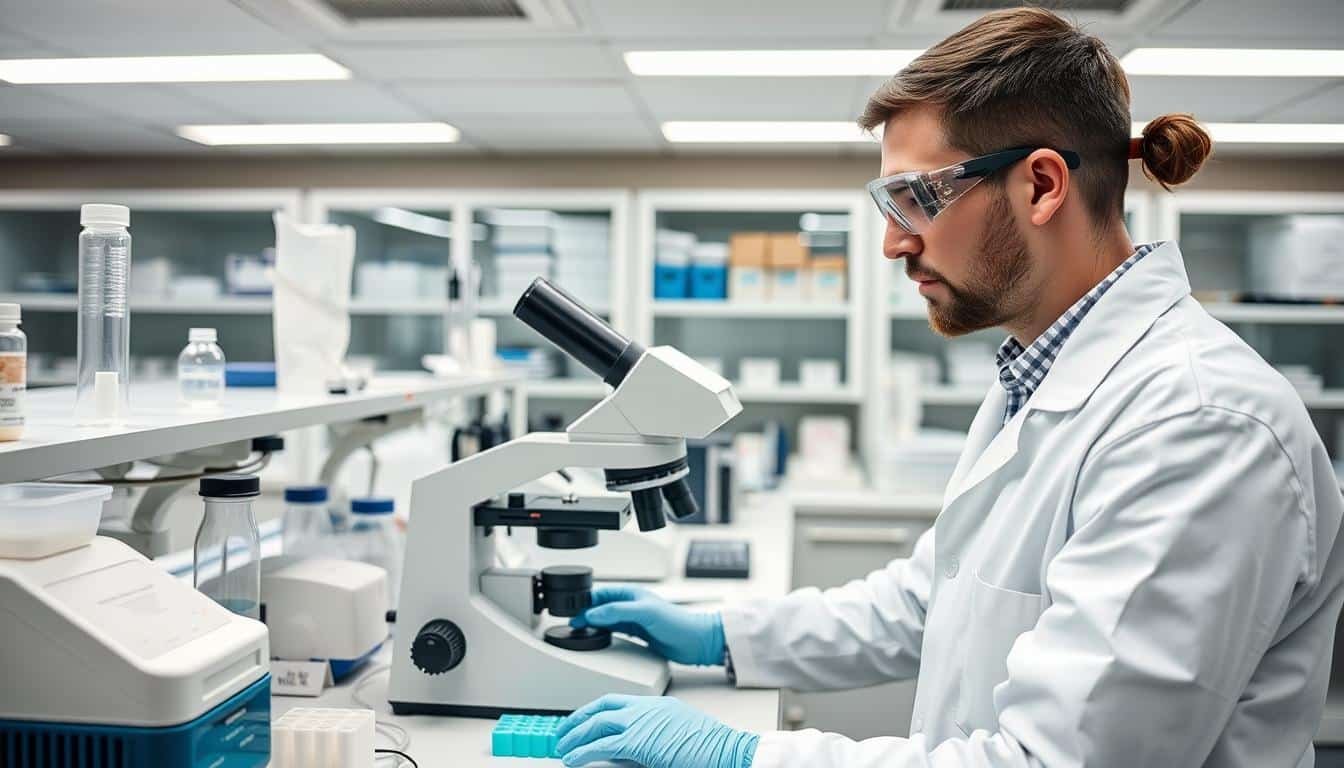Table of Contents
ToggleIf you’re into healthcare and love science and lab work, think about being a medical lab technologist. These experts are key in healthcare, doing tests and analyses to help doctors diagnose and treat patients. They play a big role in the medical world.
By learning about this job, you can start a career that changes lives. It’s a rewarding path that makes a real difference.
Key Takeaways
- Medical lab technologists do many tests and analyses in labs, helping doctors diagnose and treat patients.
- They are different from medical laboratory scientists, with their own jobs and ways to get there.
- You usually need an associate or bachelor’s degree in medical lab technology or a similar field to be one.
- Certification and licensing rules change by state, but getting a national certification, like the ASCP one, is often needed for a job.
- The job outlook for medical lab technologists looks good, with a 7% growth expected from 2021 to 2031, faster than average.
The Role and Responsibilities of a Medical Lab Technologist
Medical lab technologists, also known as medical laboratory technicians, are key in healthcare. They do many tests to help diagnose, treat, and prevent diseases. They work with doctors, nurses, and other healthcare workers to make sure tests are accurate.
Understanding the Scope of Practice
These technologists do many things. They prepare and check samples, run equipment, and look at test results. They can focus on areas like hematology, microbiology, clinical chemistry, or immunology, based on their skills.
Daily Tasks and Routine
A typical day for a medical lab technologist includes:
- Calibrating and keeping equipment right for accurate results
- Gathering, labeling, and handling samples like blood or urine
- Doing tests such as blood cell counts or infection checks
- Reading and sharing test results with healthcare workers
- Following safety rules and quality checks to keep the lab safe
They must be very careful in their work. Their results help decide how to care for patients. They follow strict laboratory procedures and keep their laboratory skills sharp for accurate laboratory testing.
| Key Responsibilities | Specialty Areas |
|---|---|
| Sample collection and processing | Hematology |
| Laboratory equipment maintenance | Microbiology |
| Performing and analyzing laboratory tests | Clinical Chemistry |
| Ensuring quality control and safety protocols | Immunology |
| Communicating test results to healthcare providers | Molecular Biology |
Also Read : Strategies For Loan Approval With Limited Credit History
Essential Skills for Success as a Medical Lab Technologist

To be a top-notch medical lab technologist, you need to focus on many skills. At the heart of this job is a sharp attention to detail. This skill is key because the results of lab tests depend on it. It’s what makes a medical lab tech stand out.
Along with a sharp eye, you must have strong technical skills. These are needed to handle the complex equipment and procedures in the lab. Also, knowing how to use computer skills is a must. This is because many tests today rely on automated machines and computer systems.
- Problem-solving skills to troubleshoot issues that may arise during testing
- Time management skills to efficiently juggle multiple tasks and meet deadlines
- Excellent hand-eye coordination for delicate laboratory work
- Robust analytical abilities to interpret test results accurately
- Physical stamina to withstand long hours on their feet
By improving these key skills, medical lab technologists help keep the medical laboratory running smoothly. This leads to better patient care.
“The attention to detail that medical lab technologists possess is truly remarkable. Their work is crucial in providing accurate and timely diagnoses for patients.”
– Dr. Sarah Johnson, Chief Medical Officer
Educational Pathways to Become a Medical Lab Technologist
Those wanting to become medical laboratory technologists have several options. The most common path is through an associate degree program in clinical laboratory science or a related field. These two-year programs give students a strong base in lab work, instruments, and clinical training. They prepare students for entry-level jobs in medical labs.
The Importance of an Associate Degree
An associate degree in medical laboratory technology is usually the least you need for this job. These programs mix general education with special training in areas like hematology, microbiology, and clinical chemistry. Students get hands-on time with lab equipment and learn to do lab tests and laboratory procedures. Many programs also offer clinical training, letting students use their skills in real laboratory settings.
Pursuing a Bachelor’s Degree
For more career growth, a bachelor’s degree in clinical laboratory science or a related degree program might be next. These four-year programs go deeper into laboratory science, building on what you learned in an associate degree. Students get more in-depth clinical training and can specialize in areas like molecular diagnostics or immunohematology. A bachelor’s degree can lead to higher-paying technologist jobs, supervisory roles, and a chance to move into a medical laboratory scientist career.
Also Read : How Does A Quick Loan Differ From A Traditional Personal Loan?
| Degree Level | Overview | Typical Courses | Career Outlook |
|---|---|---|---|
| Associate Degree | Foundational training in laboratory procedures and instrumentation, preparing students for entry-level medical laboratory technician roles. | General education, clinical laboratory science, hematology, microbiology, clinical chemistry. | Provides access to medical laboratory technician positions, with potential for advancement to technologist roles. |
| Bachelor’s Degree | Comprehensive education in laboratory science, enabling the transition from technician to technologist roles, with opportunities for specialization and managerial positions. | Advanced laboratory procedures, molecular diagnostics, immunohematology, clinical practicums. | Leads to higher-paying technologist roles, supervisory positions, and the potential to become a medical laboratory scientist. |
Whether you aim for an associate degree or a bachelor’s degree, there are many college or university programs for aspiring medical lab technologists. These programs offer the clinical training and laboratory science courses needed to start your career.
Meeting Certification and Licensing Requirements

Becoming a medical lab technologist is more than just about school. Most states need lab workers to be licensed or registered. This usually means finishing school and passing an exam. Getting certified is not always a must, but it can really help with getting a job and making more money.
The American Society for Clinical Pathology (ASCP) offers a top certification program. The ASCP Board of Certification (BOC) gives exams for the MLS(ASCP)CM credential. This is a big deal in the field. Some states also have their own rules, which might include a criminal background check when you apply.
The medical lab technologist program must get approved by a national group, like the National Accrediting Agency for Clinical Laboratory Sciences (NAACLS). This approval means the program meets high standards set by the accrediting body.
- Certification from the ASCP Board of Certification (BOC) is highly valued in the industry.
- State licensing requirements often include passing an exam and undergoing a criminal background check.
- The medical lab technologist program must be accredited by a national agency, such as NAACLS, to ensure quality and compliance.
Meeting these requirements shows that medical lab technologists are serious about their work. It proves they can give top-notch, trustworthy services in labs.
Also Read : How Can Real Estate Be Used As Loan Security?
Job Outlook and Career Advancement Opportunities

The job outlook for medical laboratory technologists is very promising. The Bureau of Labor Statistics says that medical lab technicians and medical technologists will see an 11% growth from 2020 to 2030. This is much faster than the average for all jobs. This growth is thanks to new medical technology, which lets us do more tests. It also means we need more skilled lab technologists to work with new tech and understand complex test results.
Promising Job Growth Projections
By 2030, over 26,000 new medical lab technologist jobs will be added. This shows there’s a big demand for skilled clinical laboratory technicians. It also means great career opportunities in medical laboratory science.
Potential Career Paths for Lab Technologists
- Entry-level roles in clinical or research laboratories
- Specialized positions such as cytogenetic technologist, cytotechnologist, histology technician, microbiology technologist, or biochemistry technologist
- Managerial roles, including lab manager or lab director
With more education and experience, medical lab technologists can move into many different careers. This lets them grow and change in the exciting field of medical laboratory science.
Transitioning to a Medical Laboratory Scientist

Aspiring medical laboratory scientists often start as medical laboratory technologists. They move up by getting more education, gaining hands-on experience, and getting more certifications. As a medical laboratory scientist, you’ll take on bigger tasks. You’ll help with medical research and diagnosis.
Also Read : What Should You Look For In A Business Credit Card Offers?
Roles and Responsibilities of a Medical Laboratory Scientist
A medical laboratory scientist is key in running complex tests and analyzing results. They use their deep knowledge of lab work, special tools, and data to help doctors. This includes understanding lab procedures, using advanced equipment, and interpreting data for patient care, disease diagnosis, and disease treatment.
Making the Transition from Technologist to Scientist
To move from a medical laboratory technologist to a medical laboratory scientist, you need a bachelor’s degree in medical laboratory science or a related field like biology or chemistry. This degree gives you the skills and knowledge for complex laboratory procedures, using specialized equipment, and deep insights for quality assurance and patient care.
“The transition from medical laboratory technologist to medical laboratory scientist is a rewarding path that allows you to make a greater impact in the field of healthcare.”
By growing your skills and taking on more challenging tasks, you can advance your career. You’ll play a key role in medical labs, improving healthcare quality.
Also Read : What Are The Best Practices For Ensuring Patient Care?
Medical Lab Technologist

A medical lab technologist, also known as a laboratory technologist or medical laboratory technician, is key in healthcare. They perform many tests and analyses on patient samples. They use advanced equipment and follow strict rules to make sure their results are right and reliable. These results are crucial for diagnosing and treating medical conditions.
Medical lab technologists work with doctors and other healthcare workers. They use their special skills and knowledge to help identify, watch, and manage diseases and health issues. Their work is vital for good patient care. They help make important medical decisions.
Key Responsibilities of a Medical Lab Technologist
- Collecting, processing, and analyzing patient samples, such as blood, urine, and tissue samples.
- Operating and maintaining laboratory equipment and instruments, including microscopes, automated analyzers, and specialized testing platforms.
- Performing a wide range of laboratory tests, such as hematology, clinical chemistry, microbiology, and immunology assays.
- Ensuring the accuracy and reliability of test results by following established procedures and quality control protocols.
- Collaborating with healthcare providers to interpret test results and provide insights that support clinical decision-making.
- Documenting and reporting test findings in a clear and concise manner, adhering to regulatory guidelines and laboratory policies.
The role of a medical lab technologist is very important in healthcare. Their work directly affects how patients are diagnosed, treated, and managed. With their special skills and knowledge, they are a big part of the healthcare team. They help make sure patients get the best care possible.
| Key Skills | Educational Requirements |
|---|---|
|
|
“The work of a medical lab technologist is truly invaluable in the healthcare system. Their dedication to accuracy, attention to detail, and expertise in laboratory science are essential for providing accurate and reliable test results that drive clinical decision-making.”
Also Read : What Are The Best Practices For Ensuring Patient Care?
Conclusion
Exploring the career path of a medical lab technologist shows how rewarding this job can be. We’ve looked at the different roles and what they do. We’ve also covered the key skills and education needed to succeed.
The need for skilled lab workers is growing. This means a bright future for those who become medical lab technologists. They can move up in their careers and play a key role in medical labs.
If you’re just starting or want to move forward in medical laboratory technology, this article has been helpful. It offers advice on the skills you need, how to get certified, and what the job market looks like. With this knowledge, you can set yourself up for success in this important healthcare field.
FAQs
Q: What is a medical laboratory technology program?
A: A medical laboratory technology program is designed to prepare students for a career as a medical laboratory technician (MLT) by providing them with the necessary knowledge and skills in laboratory science, including coursework in clinical experience and laboratory safety.
Q: How long does it take to complete an associate degree in medical laboratory technology?
A: Typically, an associate of applied science degree in medical laboratory technology can be completed in two years of full-time study, although this may vary based on the specific program and the student’s course load.
Q: What are the admission requirements for a medical laboratory technician program?
A: Admission requirements for a medical laboratory technician program usually include a high school diploma or equivalent, completion of prerequisite courses, and sometimes a criminal background check. Students must also submit a transcript and meet specific GPA criteria.
Q: Is it important for the medical laboratory technology program to be accredited?
A: Yes, it is crucial that the medical laboratory technology program is accredited by a recognized accrediting body, as this ensures the program meets quality standards and prepares students for certification as a medical laboratory technician.
Q: What kind of certification can I obtain after completing the MLT program?
A: After completing the medical laboratory technician program, graduates are typically eligible to take a certification exam, which can lead to certification as a medical laboratory technician (MLT) from a recognized certifying organization.
Q: What is the certification rate for graduates of medical laboratory technology programs?
A: The certification rate varies by program, but many accredited medical laboratory technology programs report high graduation rates and certification rates, indicating that students are well-prepared for their certification exams.
Q: Will I need to complete clinical experience during my training?
A: Yes, the medical laboratory technology program prepares students by including clinical experience, which is essential for gaining hands-on training in real laboratory settings before graduation.
Q: Can I find employment after completing an associate degree in medical laboratory technology?
A: Yes, graduates of an accredited medical laboratory technician program can find employment as laboratory personnel in various healthcare settings, including hospitals, clinics, and laboratories, often shortly after graduation.
Q: What are some related programs to medical laboratory technology?
A: Related programs include laboratory science programs and other health science degrees that focus on areas such as clinical laboratory science, histotechnology, and cytotechnology, which also prepare students for careers in laboratory settings.





